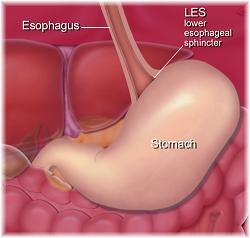The Lower Esophageal Sphincter
The lower esophageal sphincter
(also called cardiac sphincter or LES),
is a ring of smooth muscle fibers at
the junction of the
esophagus

and stomach. The most important job of the LES is to prevent stomach acid from traveling back to the esophagus.
Most of the time the LES is closed, but when you swallow, the LES opens so food and liquid can travel down the esophagus by esophageal contractions known as peristalsis. Sometimes the LES opens even when a person doesn't swallow. This is known as transient LES relaxations. It happens most of the time when your stomach is full from eating and also when you swallow air. When you burp LES relaxations will allow air out of the stomach.
The LES is a high pressure zone that is greater than stomach pressure. This results from the built-in pressure within the esophagus, the positive intra-abdominal pressure upon the esophagus, and the functioning of the sphincter.
As the LES moves above the area of your diaphragm, the positive intra-abdominal pressure decreases because the lower segment is within the negative pressure of the chest.
The strength of the LES determines if a person will experience acid reflux. The foods we eat, the liquids we drink and sometimes the different medicines we take can prevent the LES from closing properly and cause acid reflux.
Return from The Lower esophageal Sphincter to Homepage
Notice & Disclaimer: Acid Reflux Tips is for educational purposes only and is not intended for medical advice. Always consult your doctor with health questions about specific medical conditions.




